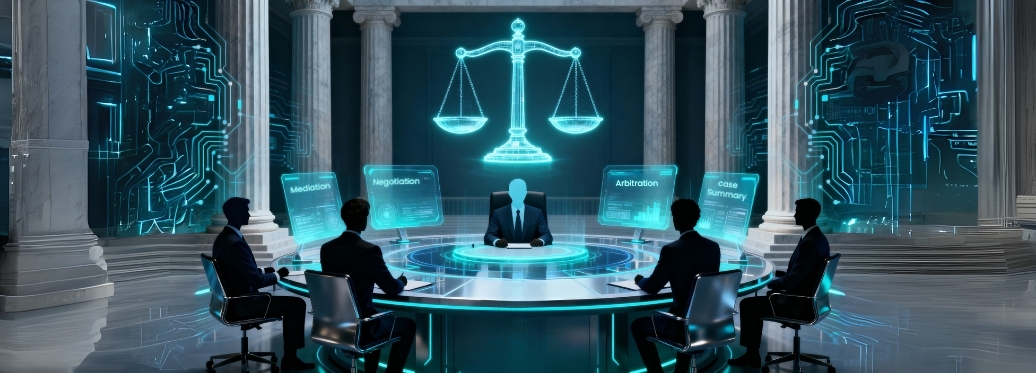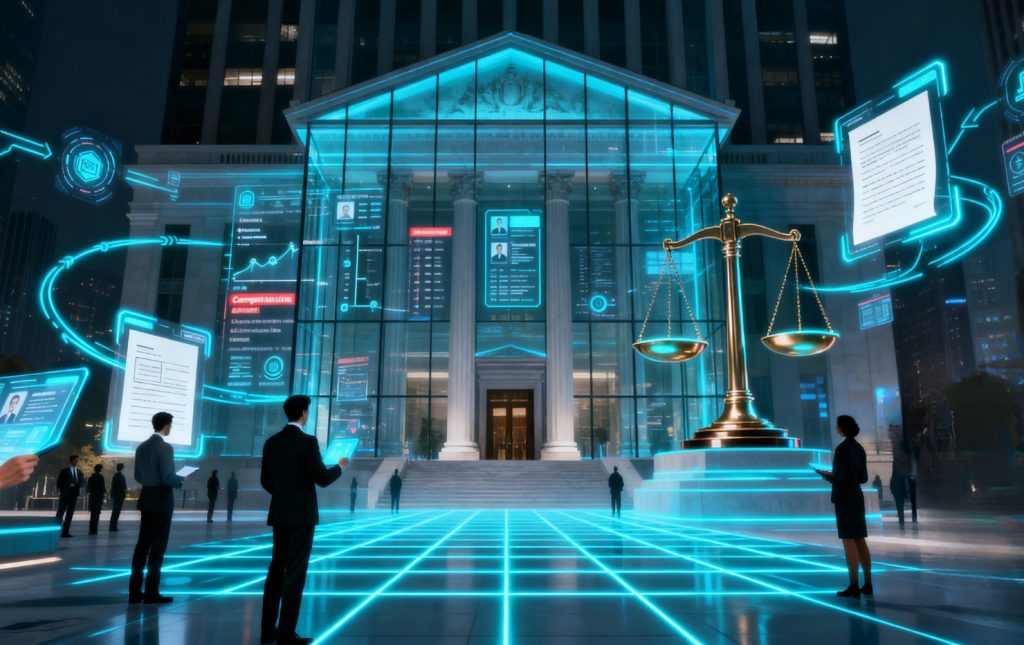“People Loses Faith When Justice Moves Slowly”
We live in a world where ordering groceries, booking travel, and getting medical consultations are just a click away. Yet, resolving disputes still means navigating the slow and traditional courtroom system.

Most people find legal processes confusing. Beyond that, many are afraid of engaging in long, exhausting legal battles. Moreover, the years of courtroom backlogs have made traditional litigation feel daunting. For many, the very idea of pursuing justice seems too complicated, too expensive and ultimately, futile.
But what if people could resolve their disputes faster, privately, and without ever stepping into a courtroom? Well, this concept already exists but it remains unfamiliar to most due to a lack of public awareness.
This blog is your guide to discovering a smarter, simpler way to seek justice. However, before we move forward and reimagine what justice can look like in the digital age, let’s first understand what exactly is wrong with traditional dispute resolution systems.
The Problem with Traditional Dispute Resolution
The current legal infrastructure is under severe pressure due to the following reasons-
- Delays are routine: Cases submitted in traditional courts can be dragged on for months, even years.
- The costs are prohibitive: Legal fees are usually expensive, and travel and time off work add up.
- Processes are intimidating: The legal systems are hard to navigate, and the processes are complex, especially without representation.
- Access is unequal: Rural populations and underserved communities often have limited legal recourse.
“Over all, according to global justice research, over 5.1 billion people worldwide lack meaningful access to justice. This statistic indicates a complete systemic failure.”
You all can probably relate to the above-mentioned issues with the existing dispute resolution system. Unfortunately, most people, being part of a community that prefers to avoid conflict, choose not to file a case, even if they have a valid grievance. They do it, just to avoid the hassle of seeking justice. But here’s the good news — a sigh of relief is waiting for you!
A System Ready for Disruption
There is no denying the fact that technology has transformed nearly every industry. Yet, the legal sector remained one of the least digitized sectors! However, that’s finally starting to change. Nowadays, from e-filing systems to video conferencing in courts, the legal world is gradually going digital. However, this transformation should go beyond just moving the courtroom to a screen. Indeed, it demands a fresh perspective to resolve disputes altogether. That’s where Alternative Dispute Resolution (ADR) comes into the picture!
What Exactly Is ADR and Why Should You Really Care?
Just imagine resolving a dispute without actually stepping into a courtroom, without having to hire a lawyer for initial/ basic steps, and above all, without waiting years for Justice. This is what Alternative Dispute Resolution (ADR) offers—a more straightforward and smarter way to settle conflicts. Let’s Understand ADR in Everyday Terms.
Alternative Dispute Resolution(ADR) is just a formal way of saying:
“Let’s skip the courtroom drama and resolve the dispute.”
Basically, instead of going through the lengthy and intimidating legal process, ADR provides with the alternatives that quickly, privately, cost effectively settle disputes.
Technically, ADR relies on three main methods:
- Negotiation: This is the most informal method of resolving a dispute. In this setting, YOU and the OTHER party talk directly to each other and try to reach a mutual agreement. It’s all about open communication and finding a win-win solution through compromise, without the need for lawyers, judges, or any third party.
- Mediation: This alternative method of dispute resolution involves a NEUTRAL third person, often called as the mediator. This third person helps both sides talk it out and work toward a fair outcome. To be precise, the mediator doesn’t impose a decision or take a particular side. They simply guide YOU and the OTHER party to have a fair conversation, keeping things on track, and encourage cooperation. All in all, the mediation method is ideal when both parties are open to resolving the issue, however it requires a help to get there.
- Arbitration: This method also involves a NEUTRAL expert, known as the arbitrator. They listen to you and the other party, examine the evidence presented, and then make a final, binding decision.
It’s a more structured, and less formal way of resolving disputes. While it may resemble a private court proceeding, arbitration is often faster, more confidential, and more efficient than traditional litigation. In most cases, arbitration decisions are legally enforceable.
In simple words, the arbitrator acts like a private judge who hears both sides and delivers a final decision.
Why Choose ADR?
Let’s be honest! Most people avoid legal action because they fear the stress, high costs, and the time it usually takes to resolve a dispute. ADR, however, completely flips that experience.
Now, you do not need to spend years dealing with complex legal procedures. Instead, ADR offers a faster, more flexible, and private path to resolution. So, you can opt for ADR whether you are stuck in a business disagreement, a consumer complaint, or even a workplace issue. Let’s focus on solutions rather than just arguments!
So, what makes ADR a smarter choice? Let’s break it down:
- It Saves Time:
Well, most ADR cases are resolved in a matter of weeks, on the contrary litigation may take years. That means less waiting, and more moving forward.
- It Costs Less:
Seeking justice has become more affordable for everyone as ADR skips the heavy legal fees and court expenses.
- It Keeps Things Private:
There is no need for public hearings, and court records. Everything happens behind closed doors, thus, protecting your privacy.
- It’s Less Stressful:
ADR is designed in a way to be more collaborative than confrontational. Just imagine, you’re not battling it out, instead, you’re working toward a solution. - You Stay in Control:
Unlike court cases, where a judge makes the final decision, ADR allows for greater involvement in the process and its outcome. In short, whether, you
Important Thing To Remember
”ADR decisions, especially in arbitration, are legally binding. It means they can be enforced just like a court judgment. Go for ADR, if preserving relationships matters to you!Now that you’ve got a basic understanding of ADR, let’s move on to something even more interesting — Online ADR. It is the modern upgrade that has become a game changer, when it comes to seeking justice.”
Choose ADR if preserving relationships matters to you!
Now that you’ve got a basic understanding of ADR, let’s move on to something even more interesting — “Online ADR.” It’s the modern upgrade that’s becoming a true game changer in the way people seek justice.
In other words, Online Dispute Resolution (ODR) is the digital evolution of ADR.
Moving forward, Jupitice has created an ODR platform that makes dispute resolution accessible from anywhere, at any time, and from any device.
“Think of ODR as ADR — but empowered by technology.”
Well, ODR takes the same trusted methods like negotiation, mediation, and arbitration. The difference is that it brings them online. Further, making the process even more convenient, faster, and more accessible.
Here are the key features of Jupitice ODR Platform:
- Rooted in UNCITRAL Frameworks: Justice ODR platform has been developed under international standards, proudly certified by ISO and CMMI for fairness and efficiency.
- Cutting-Edge Technology: Our platform is backed by AI, blockchain, and no-code solutions that streamline processes and ensure transparency.
- Accessible for All: Even rural users can connect to justice digitally as it has options like video conferencing, chat rooms, and multilingual support.
- Fast Results: Most disputes on our ODR platform are resolved within 90 days, with enforceable decisions.
“If you can shop online, why can’t you resolve disputes online?”
To help you understand it in the simplest way possible, we’ve created a quick comparison table between traditional court systems and ADR/ODR.
ADR vs. Litigation
| Feature | Traditional Court | ADR / ODR |
| Time Taken | Years | 30–90 days |
| Cost | High | Predictable, Low |
| Flexibility | Rigid | Customizable |
| Neutral Selection | Court-appointed | Party-selected |
| Confidentiality | Low | High |
| Location Dependency | Yes | Online, Anywhere |
Why does Online-ADR Matter?
Let’s understand the importance of online-ADR by looking at the human side of Justice.
Imagine Priya, a small business owner who delivered goods to a client but faced issues like delayed payments. But, instead of filing a costly lawsuit and waiting for long( for months) for a resolution, she chose a smarter way. She decided to use an ODR platform. And within just 3 weeks, Priya and her client reached a fair payment plan. She opted for the mediation method and got the dispute resolved all without leaving her office or disrupting her business operations.
This is the real power of ODR! It has made justice accessible, practical, and human-centered.
Take Away
“We reimagined Justice for the Digital Age”
Through this blog, we highlighted a paradoxical situation! We live in a world where almost everything is available at our fingertips, still the justice world is yet to be evolved.
This scenario is rapidly changing with the acceptance of the concept of Alternative Dispute Resolution (ADR) and its digital evolution of Online Dispute Resolution (ODR).
It is important to understand that the future of dispute resolution isn’t about replacing traditional courts. Rather, it is about offering smarter, faster, and more accessible alternatives to everyone.
Because, at the end of the day, it’s about making justice as simple and accessible as ordering groceries online. So, whether you’re an individual with a consumer complaint, a small business owner dealing with contract issues, or a part of a larger organization managing complex disputes, Online ADR can offer you the best path to resolution. This path exactly aligns with how we live and work today.
After all, “Justice delayed is justice denied and with Online ADR, neither has to be the case.”
 admin
admin
 16 Sep 2025
16 Sep 2025


